初一英语四大时态
- 格式:docx
- 大小:26.10 KB
- 文档页数:4
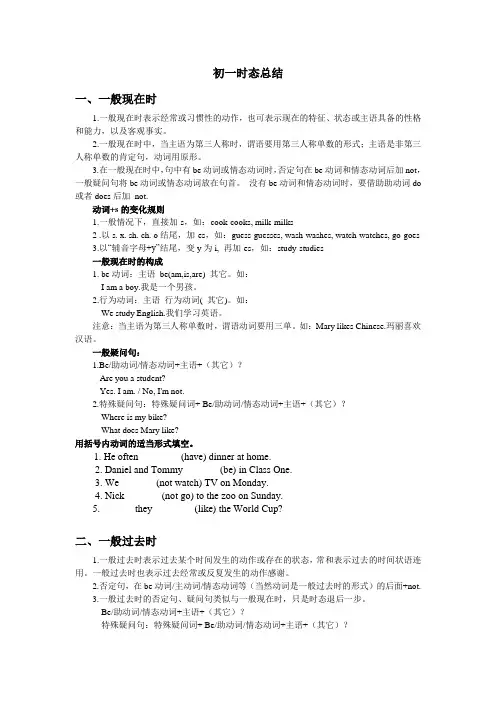
初一时态总结一、一般现在时1.一般现在时表示经常或习惯性的动作,也可表示现在的特征、状态或主语具备的性格和能力,以及客观事实。
2.一般现在时中,当主语为第三人称时,谓语要用第三人称单数的形式;主语是非第三人称单数的肯定句,动词用原形。
3.在一般现在时中,句中有be动词或情态动词时,否定句在be动词和情态动词后加not,一般疑问句将be动词或情态动词放在句首。
没有be动词和情态动词时,要借助助动词do 或者does后加not.动词+s的变化规则1.一般情况下,直接加-s,如:cook-cooks, milk-milks2 .以s. x. sh. ch. o结尾,加-es,如:guess-guesses, wash-washes, watch-watches, go-goes3.以“辅音字母+y”结尾,变y为i, 再加-es,如:study-studies一般现在时的构成1. be动词:主语be(am,is,are) 其它。
如:I am a boy.我是一个男孩。
2.行为动词:主语行为动词( 其它)。
如:We study English.我们学习英语。
注意:当主语为第三人称单数时,谓语动词要用三单。
如:Mary likes Chinese.玛丽喜欢汉语。
一般疑问句:1.Be/助动词/情态动词+主语+(其它)?-Are you a student?-Yes. I am. / No, I'm not.2.特殊疑问句:特殊疑问词+ Be/助动词/情态动词+主语+(其它)?Where is my bike?What does Mary like?用括号内动词的适当形式填空。
1. He often ________(have) dinner at home.2. Daniel and Tommy _______(be) in Class One.3. We _______(not watch) TV on Monday.4. Nick _______(not go) to the zoo on Sunday.5. ______ they ________(like) the World Cup?二、一般过去时1.一般过去时表示过去某个时间发生的动作或存在的状态,常和表示过去的时间状语连用。
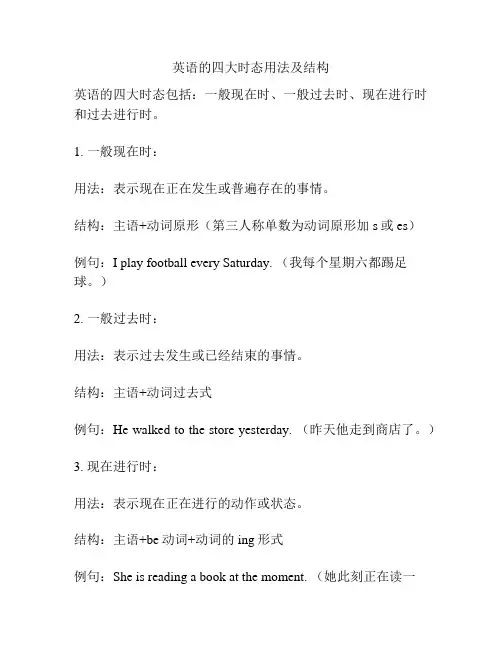
英语的四大时态用法及结构
英语的四大时态包括:一般现在时、一般过去时、现在进行时和过去进行时。
1. 一般现在时:
用法:表示现在正在发生或普遍存在的事情。
结构:主语+动词原形(第三人称单数为动词原形加s或es)
例句:I play football every Saturday. (我每个星期六都踢足球。
)
2. 一般过去时:
用法:表示过去发生或已经结束的事情。
结构:主语+动词过去式
例句:He walked to the store yesterday. (昨天他走到商店了。
)
3. 现在进行时:
用法:表示现在正在进行的动作或状态。
结构:主语+be动词+动词的ing形式
例句:She is reading a book at the moment. (她此刻正在读一
本书。
)
4. 过去进行时:
用法:表示过去某一时刻正在进行的动作。
结构:主语+was/were+动词的ing形式
例句:They were watching TV when I arrived. (我到达时他们正在看电视。
)。
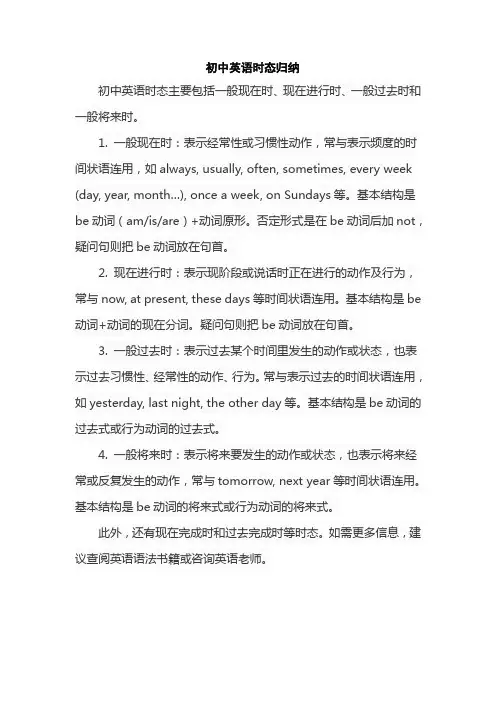
初中英语时态归纳
初中英语时态主要包括一般现在时、现在进行时、一般过去时和一般将来时。
1. 一般现在时:表示经常性或习惯性动作,常与表示频度的时间状语连用,如always, usually, often, sometimes, every week (day, year, month…), once a week, on Sundays等。
基本结构是be动词(am/is/are)+动词原形。
否定形式是在be动词后加not,疑问句则把be动词放在句首。
2. 现在进行时:表示现阶段或说话时正在进行的动作及行为,常与now, at present, these days等时间状语连用。
基本结构是be 动词+动词的现在分词。
疑问句则把be动词放在句首。
3. 一般过去时:表示过去某个时间里发生的动作或状态,也表示过去习惯性、经常性的动作、行为。
常与表示过去的时间状语连用,如yesterday, last night, the other day等。
基本结构是be动词的过去式或行为动词的过去式。
4. 一般将来时:表示将来要发生的动作或状态,也表示将来经常或反复发生的动作,常与tomorrow, next year等时间状语连用。
基本结构是be动词的将来式或行为动词的将来式。
此外,还有现在完成时和过去完成时等时态。
如需更多信息,建议查阅英语语法书籍或咨询英语老师。
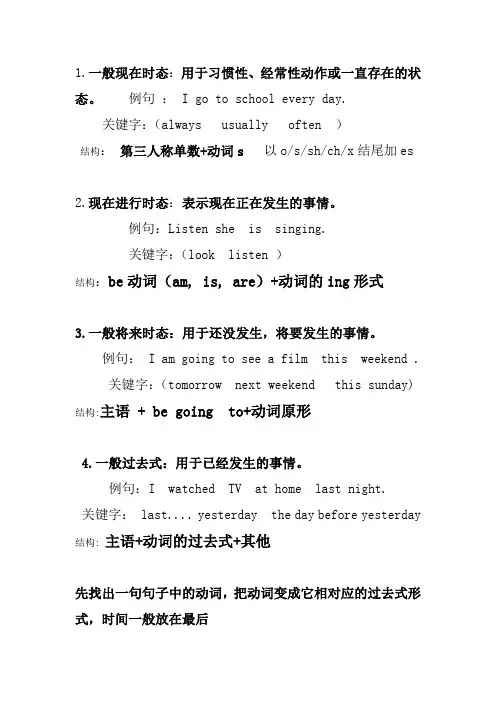
1.一般现在时态:用于习惯性、经常性动作或一直存在的状态。
例句: I go to school every day.
关键字:(always usually often )
结构:第三人称单数+动词s 以o/s/sh/ch/x结尾加es
2.现在进行时态:表示现在正在发生的事情。
例句:Listen she is singing.
关键字:(look listen )
结构:be动词(am, is, are)+动词的ing形式
3.一般将来时态:用于还没发生,将要发生的事情。
例句: I am going to see a film this weekend .
关键字:(tomorrow next weekend this sunday) 结构:主语+ be going to+动词原形
4.一般过去式:用于已经发生的事情。
例句:I watched TV at home last night.
关键字: last.... yesterday the day before yesterday 结构: 主语+动词的过去式+其他
先找出一句句子中的动词,把动词变成它相对应的过去式形式,时间一般放在最后。
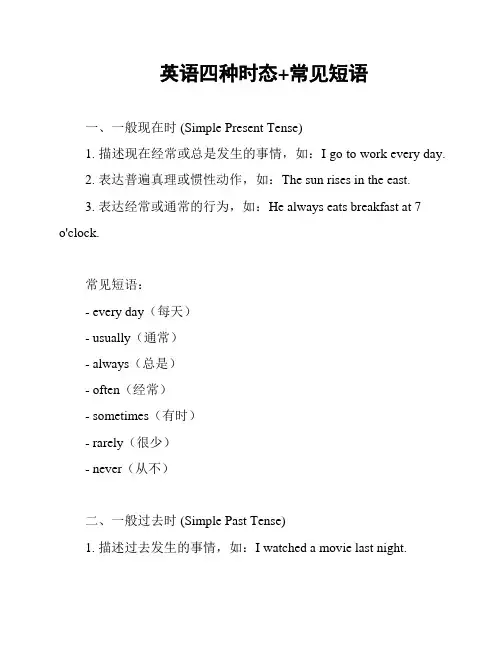
英语四种时态+常见短语一、一般现在时 (Simple Present Tense)1. 描述现在经常或总是发生的事情,如:I go to work every day.2. 表达普遍真理或惯性动作,如:The sun rises in the east.3. 表达经常或通常的行为,如:He always eats breakfast at 7o'clock.常见短语:- every day(每天)- usually(通常)- always(总是)- often(经常)- sometimes(有时)- rarely(很少)- never(从不)二、一般过去时 (Simple Past Tense)1. 描述过去发生的事情,如:I watched a movie last night.2. 表达过去常常发生的动作,如:He often went fishing when he was young.3. 表达过去的惯,如:We lived in that house for many years.常见短语:- yesterday(昨天)- last night(昨晚)- a week ago(一周前)- in the past(在过去)- when I was young(在我年轻的时候)- for many years(多年来)- in those days(在那些日子里)三、一般将来时 (Simple Future Tense)1. 表达将来会发生的事情,如:I will visit my grandparents next week.2. 表示打算或计划做的事情,如:We are going to have a party on Saturday.3. 表达预测的事件,如:I think he will win the game.常见短语:- next week(下周)- in the future(在未来)- tomorrow(明天)- on Saturday(在星期六)- be going to(打算)- will(将)- I think(我认为)四、现在进行时 (Present Continuous Tense)1. 描述现在正在发生的事情,如:She is studying in the library right now.2. 表达将来安排好的事情,如:We are leaving for a vacation next month.3. 表示暂时的情况,如:He is living with his sister while his house is being renovated.常见短语:- right now(现在)- at the moment(此刻)- in the near future(不久的将来)- next month(下个月)- while(在...期间)- currently(目前)- at present(现在)以上是英语中四种常见的时态以及常见的短语,掌握这些时态和短语可以帮助你更准确地表达过去、现在和将来的事件和状态。

初一英语时态总结一、一般现在时态(Simple Present Tense)1. 表示经常性或习惯性的动作、状态或真理。
例句:I often go to school by bus.(我经常坐公交车去学校。
) Water boils at 100 degrees Celsius.(水在100摄氏度时沸腾。
)2. 表示客观事实、科学真理或普遍规律。
例句:The sun rises in the east.(太阳从东方升起。
)Water freezes at 0 degrees Celsius.(水在0摄氏度时结冰。
) 3. 表示主语的特性或个人喜好。
例句:She likes playing basketball.(她喜欢打篮球。
)He is a smart boy.(他是个聪明的男孩。
)二、一般过去时态(Simple Past Tense)1. 表示过去某个时间发生的动作或状态。
例句:I went to the park yesterday.(我昨天去了公园。
) They lived in China when they were young.(他们年轻时住在中国。
)2. 表示过去的习惯或经常性动作。
例句:We used to play soccer every weekend.(我们过去每个周末都踢足球。
)She always studied until late at night.(她过去总是学习到很晚。
)3. 表示过去的真理或规律。
例句:Dinosaurs existed millions of years ago.(恐龙存在于几百万年前。
)The Earth was flat according to ancient beliefs.(根据古代的信仰,地球是平的。
)三、一般将来时态(Simple Future Tense)1. 表示将来某个时间或在某个时间之后发生的动作或状态。
例句:I will visit my grandparents next week.(下周我会去看望我的祖父母。
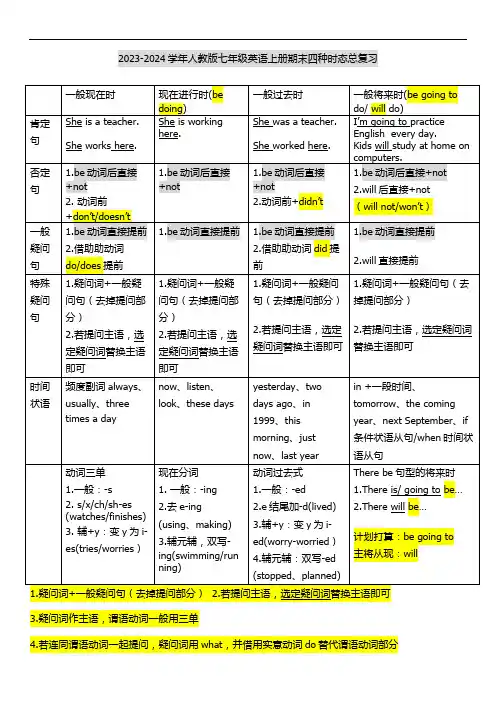
2023-2024学年人教版七年级英语上册期末四种时态总复习1.疑问词+一般疑问句(去掉提问部分)2.若提问主语,选定疑问词替换主语即可3.疑问词作主语,谓语动词一般用三单4.若连同谓语动词一起提问,疑问词用what ,并借用实意动词do 替代谓语动词部分一般现在时 现在进行时(be doing)一般过去时 一般将来时(be going to do/ will do)肯定句 She is a teacher.She works here. She is working here.She was a teacher.She worked here. I ’m going to practice English every day.Kids will study at home on computers.否定句1.be 动词后直接+not2. 动词前+don ’t/doesn ’t 1.be 动词后直接+not1.be 动词后直接+not2.动词前+didn ’t1.be 动词后直接+not2.will 后直接+not (will not/won ’t ) 一般疑问句 1.be 动词直接提前 2.借助助动词do/does 提前 1.be 动词直接提前 1.be 动词直接提前2.借助助动词did 提前1.be 动词直接提前2.will 直接提前特殊疑问句1.疑问词+一般疑问句(去掉提问部分)2.若提问主语,选定疑问词替换主语即可1.疑问词+一般疑问句(去掉提问部分)2.若提问主语,选定疑问词替换主语即可 1.疑问词+一般疑问句(去掉提问部分) 2.若提问主语,选定疑问词替换主语即可 1.疑问词+一般疑问句(去掉提问部分)2.若提问主语,选定疑问词替换主语即可时间状语频度副词always 、usually 、three times a daynow 、listen 、look 、these daysyesterday 、two days ago 、in 1999、this morning 、just now 、last yearin +一段时间、tomorrow 、the coming year 、next September 、if 条件状语从句/when 时间状语从句动词三单1.一般:-s2. s/x/ch/sh-es (watches/finishes)3. 辅+y :变y 为i-es(tries/worries )现在分词1. 一般:-ing2.去e-ing (using 、making)3.辅元辅,双写-ing(swimming/running)动词过去式 1.一般:-ed 2.e 结尾加-d(lived) 3.辅+y :变y 为i- ed(worry-worried ) 4.辅元辅:双写-ed (stopped 、planned)There be 句型的将来时 1.There is/ going to be … 2.There will be …计划打算:be going to 主将从现:will注意:动词原形四种情形:1.情态动词(can/may/might/have to/must/will/would/should/shall)+动词原形2.祈使句中,用动词原形3.助动词do/don’t/does/doesn’t/did/didn’t 后,用动词原形4.使役动词let/make/have sb. do注意:v-ing的三种情况1.现在进行时be doing2.介词+v-ing3.enjoy/miss/mind/finish/have fun/practice/keep/suggest/avoid/can’t help/consider/feel like/give up doing注意:主将从现主将从现主句一般将来时从句一般现在时will +动原if后引导的是从句动原/三单If it rains tomorrow, we will not go to the zoo.从句(现)主句(将)If he doesn’t come, I will phone/call him.从句(现)主句(将)Eg:肯定句: I’m going to practice basketball every day.否定句:I’m not going to practice basketball every day.一般疑问句:Are you going to practice basketball every day.特殊疑问句:1. 若提问主语,选定疑问词替换掉主语即可Who is going to practice basketball every day? (对I提问)2. 疑问词+一般疑问句(去掉提问部分)What are you going to practice every day? (对basketball提问)How often are you going to practice basketball? (对every day提问)What are you going to do every day? (对practice basketball提问)肯定句:Tom is going to move to Shanghai next year. (习题)否定句:__________________________________________.一般疑问句: ____________________________________________. 特殊疑问句:1. _______________________________________________________.2. _______________________________________________________. 3_______________________________________________________.4.______________________________Eg:肯定句: Robots will think like humans in the future.否定句:Robots won’t think like humans in the future.一般疑问句:Will robots think like humans in the future?.特殊疑问句:1. 若提问主语,选定疑问词替换掉主语即可what will think like humans in the future? (对Robots提问)2. 疑问词+一般疑问句(去掉提问部分)What will robots think like in the future? (对humans提问)When will robots think like humans? (对in the future提问)What will robots do in the future? (对think like humans提问)肯定句: Cities will be more crowded and polluted in 100 years.(习题) 否定句:__________________________________________.一般疑问句: ____________________________________________. 特殊疑问句:1. _______________________________________________________.2. _______________________________________________________. 3_______________________________________________________.Eg:肯定句: Tom visited his grandpa by train last week.否定句:Tom didn’t visit his grandpa by train last week.一般疑问句:Did Tom visit his grandpa by train last week.特殊疑问句:1. 若提问主语,选定疑问词替换掉主语即可Who visited his grandpa by train last week? (对Tom提问)2. 疑问词+一般疑问句(去掉提问部分)Who did Tom visit by train last week? (对his grandpa提问)when did Tom visit his grandpa by train ? (对last week提问)How did Tom visit his grandpa last week? (对by train提问)What did Tom do by train last week? (对visited his grandpa提问)肯定句:Tom went to Beijing with his friends yesterday? (习题)否定句:__________________________________________.一般疑问句: ____________________________________________. 特殊疑问句:1. _______________________________________________________.2. _______________________________________________________. 3_______________________________________________________.4.________________________________________________________.。
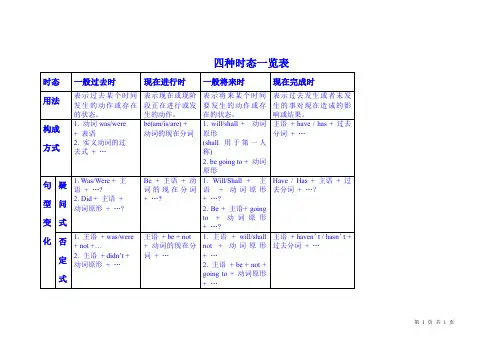
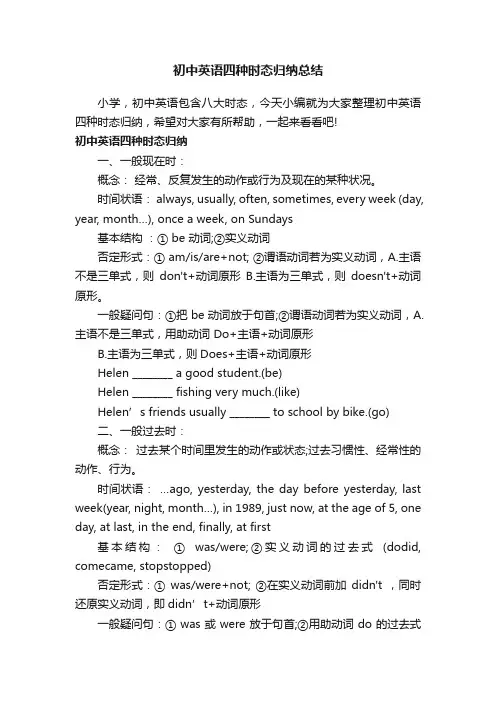
初中英语四种时态归纳总结小学,初中英语包含八大时态,今天小编就为大家整理初中英语四种时态归纳,希望对大家有所帮助,一起来看看吧!初中英语四种时态归纳一、一般现在时:概念:经常、反复发生的动作或行为及现在的某种状况。
时间状语: always, usually, often, sometimes, every week (day, year, month…), once a week, on Sundays基本结构:① be 动词;②实义动词否定形式:① am/is/are+not; ②谓语动词若为实义动词,A.主语不是三单式,则don't+动词原形B.主语为三单式,则doesn't+动词原形。
一般疑问句:①把 be 动词放于句首;②谓语动词若为实义动词,A.主语不是三单式,用助动词 Do+主语+动词原形B.主语为三单式,则Does+主语+动词原形Helen ________ a good student.(be)Helen ________ fishing very much.(like)Helen’s friends usually ________ to school by bike.(go)二、一般过去时:概念:过去某个时间里发生的动作或状态;过去习惯性、经常性的动作、行为。
时间状语:…ago, yesterday, the day before yesterday, last week(year, night, month…), in 1989, just now, at the age of 5, one day, at last, in the end, finally, at first基本结构:①was/were;②实义动词的过去式(dodid, comecame, stopstopped)否定形式:①was/were+not; ②在实义动词前加didn't ,同时还原实义动词,即didn’t+动词原形一般疑问句:① was 或 were 放于句首;②用助动词 do 的过去式did 提问,同时还原实义动词。

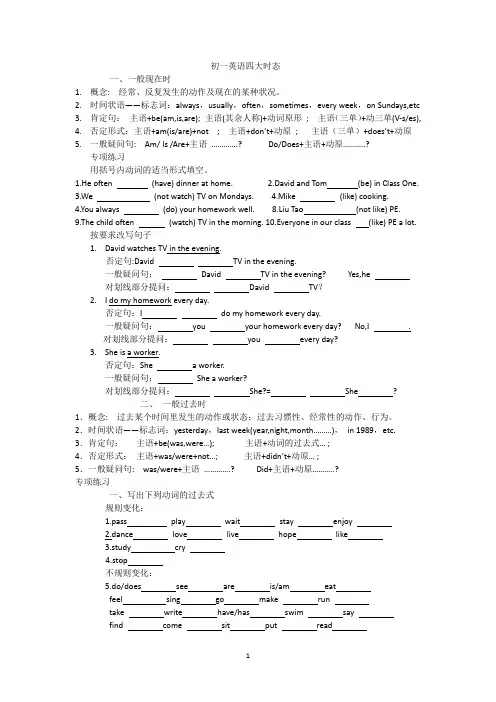
初一英语四大时态一、一般现在时1.概念: 经常、反复发生的动作及现在的某种状况。
2.时间状语——标志词:always,usually,often,sometimes,every week,on Sundays,etc3.肯定句:主语+be(am,is,are); 主语(其余人称)+动词原形; 主语(三单)+动三单(V-s/es),4.否定形式:主语+am(is/are)+not ; 主语+don’t+动原; 主语(三单)+does’t+动原5.一般疑问句: Am/ Is /Are+主语………….? Do/Does+主语+动原………..?专项练习用括号内动词的适当形式填空。
1.He often (have) dinner at home.2.David and Tom (be) in Class One.3.We (not watch) TV on Mondays.4.Mike (like) cooking.4.You always (do) your homework well. 8.Liu Tao (not like) PE.9.The child often (watch) TV in the morning. 10.Everyone in our class (like) PE a lot.按要求改写句子1.David watches TV in the evening.否定句:David TV in the evening.一般疑问句:David TV in the evening? Yes,he对划线部分提问:David TV?2.I do my homework every day.否定句:I do my homework every day.一般疑问句:you your homework every day? No,I .对划线部分提问:you every day?3.She is a worker.否定句:She a worker.一般疑问句:She a worker?对划线部分提问:She?= She ?二、一般过去时1.概念: 过去某个时间里发生的动作或状态;过去习惯性、经常性的动作、行为。
初一时态与语态详解英语学习中,时态和语态是非常重要的概念。
初一阶段的学生常常面临对时态和语态的混淆和困惑。
本文将详细解释初一阶段需要掌握的时态和语态相关知识,帮助学生们更好地理解和运用。
一、时态1. 一般现在时态(Simple Present)一般现在时态用于描述经常性或普遍性的动作、习惯或真理。
例如:I play basketball every day. (我每天打篮球。
)2. 现在进行时态(Present Continuous)现在进行时态表示现在正在进行的动作。
例如:She is studying in the library. (她正在图书馆学习。
)3. 一般过去时态(Simple Past)一般过去时态用于描述过去发生的动作或状态。
例如:He watched a movie yesterday. (他昨天看电影了。
)4. 过去进行时态(Past Continuous)过去进行时态表示过去某个时刻正在进行的动作。
例如:I was reading a book at that time. (那时我正在读书。
)5. 一般将来时态(Simple Future)一般将来时态用于描述将来会发生的动作或事件。
例如:They will visit their grandparents next week. (下周他们将会拜访他们的祖父母。
)6. 现在完成时态(Present Perfect)现在完成时态表示过去发生的动作对现在产生的影响或结果。
例如:She has washed the dishes. (她洗过了碗。
)7. 过去完成时态(Past Perfect)过去完成时态用于描述过去某个时间之前已经发生的动作。
例如:I had finished my homework before he arrived. (他到达之前我已经完成了我的作业。
)8. 将来完成时态(Future Perfect)将来完成时态表示将来某个时间之前将会完成的动作。
初一英语时态总结英语时态对于初学者来说是一个比较难以掌握的知识点。
在初中阶段,学生们开始接触各种不同的时态,如简单现在时、一般过去时、一般将来时等。
本文将对初一英语时态进行总结和介绍,帮助初学者更好地理解和运用时态知识。
1. 简单现在时 (Simple Present Tense)简单现在时用来表示经常性、习惯性或普遍性的动作。
一般情况下,我们只需要在动词原形后加上第三人称单数的“s”即可。
例如:He plays soccer on weekends.(他周末踢足球。
)此外,也可以使用一些表示频率的词汇,如always,often,sometimes等。
2. 一般过去时 (Simple Past Tense)一般过去时用来表示发生在过去某个时间的动作或状态。
对于大多数动词而言,其过去式形态是在动词原形后加上-ed。
例如:I watcheda movie last night.(昨晚我看了一部电影。
)然而,也有一些特殊的动词需要记忆其不规则的过去式形态,如go-went、eat-ate等。
3. 一般将来时 (Simple Future Tense)一般将来时用来表示将来某时将要发生的动作或状态。
一般情况下,我们使用will加动词原形来构成简单将来时。
例如:They will go to the park tomorrow.(他们明天将去公园。
)此外,我们也可以使用begoing to来表示预计将要进行的动作。
例如:She is going to visit her grandmother next week.(她下周将要去看她的奶奶。
)4. 现在进行时 (Present Continuous Tense)现在进行时用来表示正在进行的动作。
构成现在进行时的方式为be动词(am/is/are)加动词的现在分词形式(-ing形式)。
例如:He is eating dinner at the moment.(他此刻正在吃晚餐。
七年级英语时态总结一、一般现在时。
1. 概念。
- 表示经常或习惯性的动作或存在的状态。
例如:I often go to school by bike.(我经常骑自行车去上学。
)He is a student.(他是一名学生。
)2. 构成。
- be动词:主语为第一人称单数(I)时用am;主语为第三人称单数(he/she/it 等)时用is;主语为复数(we/you/they等)或第二人称单数(you)时用are。
例如:I am a girl. He is my brother. They are my friends.- 实义动词:- 当主语为第三人称单数时,动词要加 -s或 -es。
例如:He likes reading books.(like变成likes)- 当主语为其他人称时,动词用原形。
例如:We play football on Sundays.3. 时间状语。
- 常与often(经常), usually(通常), sometimes(有时), always(总是), every day/week/month/year(每天/周/月/年)等连用。
例如:She usually gets up at six o'clock.二、现在进行时。
1. 概念。
- 表示现在正在进行的动作或存在的状态。
例如:Look! They are playing basketball.(看!他们正在打篮球。
)2. 构成。
- be动词(am/is/are)+动词的 -ing形式。
例如:I am reading a book. Heis watching TV. They are having lunch.3. 动词 -ing形式的构成规则。
- 一般在动词原形末尾加 -ing。
如:go - going, play - playing。
- 以不发音的字母e结尾的动词,先去掉e,再加 -ing。
如:write - writing, have - having。
人教版七年级英语时态总结人教版七年级英语时态总结如下:1、一般现在时(1)构成:主语+be动词(am/is/are)+其他。
(2)用法:表示现在经常发生的动作或存在的状态。
例句:He is a student. 他是一个学生。
2、现在进行时(1)构成:主语+be动词(am/is/are)+动词-ing形式。
(2)用法:表示现在正在进行的动作或存在的状态。
例句:He is listening to the music now.他现在正在听音乐。
3、现在完成时(1)构成:主语+have/has+动词的过去分词。
(2)用法:表示过去发生的动作对现在造成的影响或结果。
例句:I bought a new house, but I haven't sold my old one yet, so at the moment I have two houses.我买了一所新房子,但是还没有卖掉旧的,所以现在我又两所房子。
4、现在完成进行时(1)构成:主语+have/has+been+动词的ing形式。
(2)用法:表示从过去某一时刻开始一直延续到现在的动作或状态,强调这个动作可能会继续下去。
例句:We have been working on this project for over a month now.到目前为止,我们一直在处理那个项目,已经花了一个多月时间了。
5、一般过去时(1)构成:主语+动词的过去式。
(2)用法:表示过去某个时间发生的动作或存在的状态。
例句:I bought some fruits yesterday.我昨天买了一些水果。
6、过去进行时(1)构成:主语+was/were+动词-ing形式。
(2)用法:表示过去某个时间正在进行的动作或存在的状态。
例句:I was travelling in London last summer vacation.去年暑假我在伦敦旅行。
7、过去完成时(1)构成:主语+had+动词的过去分词。
初一上四大时态知识点归纳总结一、什么是时态?时态是指动词所表示的动作或状态在时间上的不同变化。
英语中常用的四大时态包括现在时态、过去时态、将来时态和完成时态。
二、现在时态1. 一般现在时(Simple Present)- 表示经常性或习惯性的动作或状态:I play basketball every weekend.- 表示现阶段的状况或真理:The sun rises in the east.2. 现在进行时(Present Continuous)- 表示目前正在进行的动作:She is studying in her room.- 表示现阶段暂时的情况:I'm staying at my friend's house while my house is being renovated.三、过去时态1. 一般过去时(Simple Past)- 表示过去某个时间发生的动作或状态:He finished his homework yesterday.- 表示过去的经常性或习惯性动作:I often went fishing with my dad when I was young.2. 过去进行时(Past Continuous)- 表示过去某个时间正在进行的动作:They were playing soccer when it started to rain.- 表示过去某个时间暂时的情况:She was living in Paris for six months.四、将来时态1. 将来时(Simple Future)- 表示将来某个时间要发生的动作:They will arrive at 8 pm tomorrow.- 表示将来的计划、安排或意愿:I will help you with your project.2. 将来进行时(Future Continuous)- 表示将来某个时间正在进行的动作:This time tomorrow, I will be flying to New York.- 表示将来某个时间暂时的情况:She will be staying at a hotel until her new house is ready.五、完成时态1. 现在完成时(Present Perfect)- 表示过去发生并与现在有关的动作:I have finished my homework.- 表示经历过的经验或已完成的动作:He has visited Paris twice.2. 过去完成时(Past Perfect)- 表示过去某个时间之前已经发生的动作:She had already eaten when I arrived.- 表示过去的经历或经验:By the time they reached the theater, the show had already started.3. 将来完成时(Future Perfect)- 表示将来某个时间之前将会完成的动作:By this time next year, I will have graduated from university.- 表示对将来的预测或推测:They will have finished the project by tomorrow.总结:初一上学期所学的四大时态包括现在时态、过去时态、将来时态和完成时态。
初一英语四大时态一、一般现在时1.概念: 经常、反复发生的动作及现在的某种状况。
2.时间状语——标志词:always,usually,often,sometimes,every week,on Sundays,etc3.肯定句:主语+be(am,is,are); 主语(其余人称)+动词原形; 主语(三单)+动三单(V-s/es),4.否定形式:主语+am(is/are)+not ; 主语+don’t+动原; 主语(三单)+does’t+动原5.一般疑问句: Am/ Is /Are+主语………….? Do/Does+主语+动原………..?专项练习用括号内动词的适当形式填空。
1.He often (have) dinner at home.2.David and Tom (be) in Class One.3.We (not watch) TV on Mondays.4.Mike (like) cooking.4.You always (do) your homework well. 8.Liu Tao (not like) PE.9.The child often (watch) TV in the morning. 10.Everyone in our class (like) PE a lot.按要求改写句子1.David watches TV in the evening.否定句:David TV in the evening.一般疑问句:David TV in the evening? Yes,he对划线部分提问:David TV?2.I do my homework every day.否定句:I do my homework every day.一般疑问句:you your homework every day? No,I .对划线部分提问:you every day?3.She is a worker.否定句:She a worker.一般疑问句:She a worker?对划线部分提问:She?= She ?二、一般过去时1.概念: 过去某个时间里发生的动作或状态;过去习惯性、经常性的动作、行为。
2.时间状语——标志词:yesterday,last week(year,night,mont h………),in 1989,etc. 3.肯定句:主语+be(was,were…); 主语+动词的过去式… ;4.否定形式:主语+was/were+not…; 主语+didn’t+动原… ;5.一般疑问句: was/were+主语………….? Did+主语+动原………..?专项练习一、写出下列动词的过去式规则变化:1.pass play wait stay enjoy2.dance love live hope like3.study cry4.stop不规则变化:5.do/does see are is/am eatfeel sing go make runtake write have/has swim sayfind come sit put read二、用动词的适当形式填空(was/were/is).1.I at school just now.2.He at the camp last week.3.We students two years ago.4.They on the farm a moment ago.5.Yang Ling eleven years old last year.6.There lots of grapes hereyesterday.7.There some milk in the fridge on Sunday. 8.There an apple on the plate yesterday.9.Today the second of June. 10.Yesterday the first of June.三、用动词的适当形式填空。
1.I (watch)a cartoon last Saturday.2.Her father (read) a newspaper last night.3.We to zoo yesterday,he to the park,too. (go)4. you (visit)your relatives last Spting Festival?5. he (do) homework on Sunday?Yes,he .6.What she (find) in the garden last morning?She (find)abeautiful butterfly.7.We all (have) a good time last night.8. she (practice) her guitar yesterday?No,she .9.They all (go) to the mountains yesterday morning.10.She (not visit) her aunt last weekend.She (stay) at home and (do) some cleaning.11.When you (write) this song?I (write) it last year.12.Did she (have) diner at home?四、句型转换。
1.The children had a good time in the park.否定句:The children a good time in the park.一般疑问句:The children mma good time in the park?Yes,对划线部分提问:the children a good time?2.Ann did her homework yesterday evening.否定句:Ann her homework yesterday evening.一般疑问句:Ann her homework yesterday evening?No, .对划线部分提问:Ann yesterday evening?3.He read an English book last week.否定句:He an English book last week.一般疑问句:he an English book last week?对划线部分提问:book he last week?4.There were nine people in the room.否定句:There nine people in the room.一般疑问句:there nine people in the room?No, .对划线部分提问:were there in the room?三、现在进行时1.概念: 表示现阶段或说话时正在进行的动作或行为。
2.时间状语——标志词:now,look,listen,at this time,these days,etc.3.基本结构:be(am/is/ are)+doing;4.否定形式:am(is/are)+not+doing ;5.一般疑问句: 把be动词放于句首.专项练习二、用所给的动词的适当形式填空。
1.What are you (do)? I am (read).2.Is he (swim)?3.Listen!Class 2 and Class 3 (sing).4.The boy (draw) a picture now.5.What you (do)now?三、句型转换。
1.The boy is playing basketball now.否定句:The boy basketball now.一般疑问句:the boy basketball now?对划线部分提问:the boy now?2.They are singing in the classroom.否定句:They singing in the classroom.一般疑问句:they in the classroom?对划线部分提问:they ?四、一般将来时1.概念: 表示将要发生的动作或存在的状态及打算、计划或准备做某事。
2.时间状语——标志词:tomorrow,next day(week,month,year…),soon,the dayaftertomorrow,in+时间段,etc.3.基本结构:①be going to+V(原形) ②will(任意人称)/shall第一人称+V(原形)4.否定句:在be(am/is/are)动词后加not;在will后加not—won’t.shall+not----shan’t5.一般疑问句:把be/will提到句首,some改为any;and改为or.6. be going to和will的区别be going to和will的用法虽然都表示将来发生的动作或情况,但它们的用法是有区别的。
1、be going to主要用于:⑴表示事先经过考虑、安排好打算要做的事情。
What are you going to do today?今天你们打算做什么?I’m going to play the violin.我打算拉小提琴。
She’s going to play the piano.她打算弹钢琴。
⑵表示根据目前某种迹象判断,某事非常有可能发生。
Look!There come the dark clouds.It is going to rain.瞧!乌云密集,天要下雨了。
I’m afraid I amgoing to have a cold.恐怕我要患重感冒。
2、will主要用于在以下几个方面:⑴、表示单纯的未来“将要”,通用各个人称。
They will go to visit the factory tomorrow.明天他们将去工厂参观。
I’ll come with Wang Bing,Liu Tao and Yang Ling.我将和王兵、刘涛、杨玲一起来。
⑵、表示不以人的意志为转移的自然发展的未来的事。
Today is Saturday. Tomorrow will be Sunday. 今天是星期六。
明天(将)是星期日。
He will be thirty years old this time next year.明年这个时候他就(将)三十岁。
3、问对方是否愿意做某事或表示客气地邀请或命令。
Will you please turn on the radio?请打开收音机好吗?Will you go to the zoo with me ?你和我一起去动物园好吗?练习:一、填空。